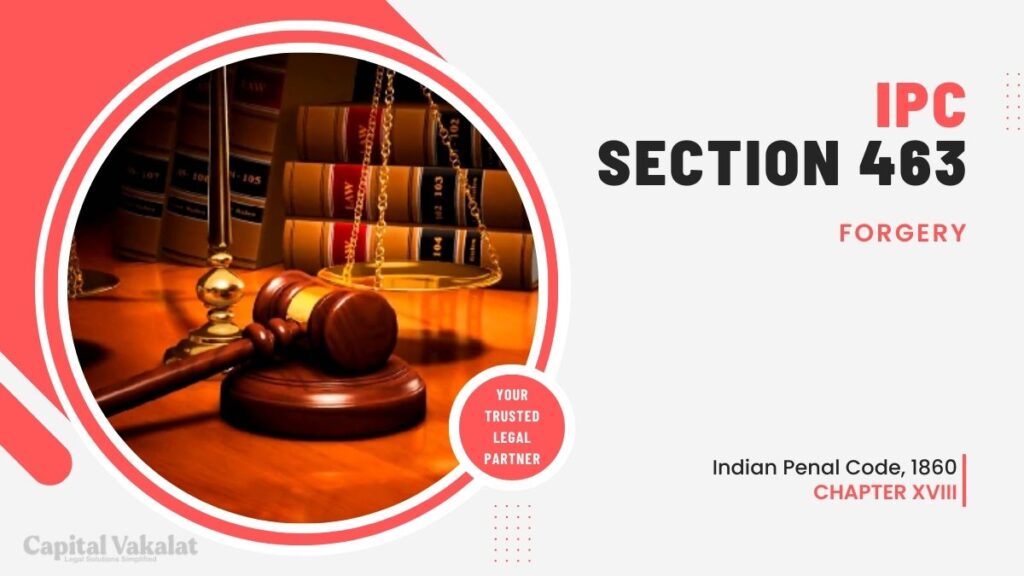Forgery is a serious offense that encompasses a wide range of deceptive practices. Under Section 463 of the Indian Penal Code (IPC), forgery is clearly defined, and those found guilty can face significant legal consequences.

Forgery, as defined by Section 463 IPC, involves the creation of false documents or alterations with the intent to deceive or defraud. This legal provision is crucial in maintaining the integrity of various transactions and legal processes. Understanding the intricacies of Section 463 is essential for both legal professionals and the general public.
Elements of Forgery Defined by Section 463
Section 463 outlines specific elements that constitute forgery. Acts such as making false documents, altering existing documents, and using forged documents are covered by this section. For example, forging a signature, creating counterfeit documents, or tampering with official records all fall under the purview of Section 463.
Penalties for Forgery Offenses
The penalties for forgery offenses vary based on the severity and nature of the crime. Section 463 IPC prescribes different punishments for different types of forgery, ranging from fines to imprisonment. It is crucial for individuals to be aware of these consequences to deter them from engaging in fraudulent activities.
Cases and Precedents
Landmark cases related to Section 463 have played a significant role in shaping legal interpretations. Examining these cases provides insight into how the judiciary views and deals with forgery offenses. Precedents set by the courts often influence subsequent legal proceedings and outcomes.
Forgery and Modern Technology
In the digital age, forgery has taken on new dimensions. Section 463 IPC, while originally crafted for a pre-digital era, has had to adapt to technological advancements. Digital forgery, including the creation of fake electronic documents and signatures, is now a pertinent issue, and the legal system must address these challenges.
Defenses Against Forgery Charges
Individuals accused of forgery may have legal defenses at their disposal. It could involve proving innocence, challenging the evidence presented, or highlighting procedural errors. Understanding these defenses is crucial for those facing forgery allegations.
Reporting and Investigating Forgery
Law enforcement plays a vital role in investigating forgery cases. Individuals who suspect forgery or have fallen victim to it need to know how to report such incidents. Timely reporting and cooperation with authorities are essential in bringing perpetrators to justice.
Preventing Forgery: Tips for Individuals and Businesses
Prevention is key when it comes to forgery. Individuals can take steps to protect themselves, such as safeguarding personal documents and being cautious in financial transactions. Businesses, too, can implement security measures to reduce the risk of forgery.
International Perspectives on Forgery Laws
Forgery laws vary across countries, but certain principles are universal. Comparing international perspectives on forgery can provide insights into the effectiveness of different legal frameworks and highlight areas for improvement.
The Evolving Nature of Forgery: Future Considerations
As technology continues to advance, forgery methods are likely to evolve. Section 463 IPC may need periodic updates to address emerging challenges. Examining the future landscape of forgery can help legislators and legal professionals prepare for what lies ahead.
Conclusion
In conclusion, Section 463 IPC is a critical legal provision that addresses forgery in various forms. Its interpretation and application have evolved over time, reflecting changes in technology and societal norms. Understanding the elements of forgery, penalties, and possible defenses is essential for navigating legal challenges related to this offense.
Frequently Asked Questions
What should I do if I suspect someone of forging my signature on a document?
Report the incident to the authorities immediately and gather any evidence you may have, such as witnesses or documentation.
Can businesses be held liable for forgery committed by their employees?
Businesses are responsible for implementing proper security measures, but liability may depend on the circumstances. Legal advice should be sought in such cases.
How can individuals protect themselves from falling victim to forgery?
Safeguard personal documents, use secure channels for transactions, and stay informed about common forgery tactics.
Are there international agreements addressing cross-border forgery cases?
While there are no universal agreements, some countries may have extradition treaties or cooperative arrangements for handling cross-border forgery cases.